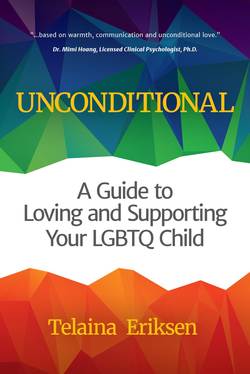Читать книгу Unconditional - Telaina Eriksen - Страница 7
На сайте Литреса книга снята с продажи.
ОглавлениеForeword
If you’re wanting honest-to-goodness practical advice from a parent who had to figure out how to raise and support a lesbian, gay, bisexual, transgender, queer or questioning (LGBTQ) child, then you’ve found it here. This book discusses all the stages of parenting an LGBTQ child from toddlerhood to adulthood, how to understand sexual orientation versus gender identity from what to do before the “coming out” to dating and marriage, and all directly from the experience and perspective of a real-life parent.
For me to fully endorse this book, I first need to explain a little about me. I’ve been a licensed clinical psychologist since 2008 and have worked primarily in university counseling centers and community mental health clinics in Southern California. I’ve provided individual, couples, family, and group therapy while specializing in youth, women’s issues, people of color issues, and LGBTQ issues. And much of my passion comes from my own personal experience as an LGBTQ community advocate. I came out as bisexual in 1999, and went on to co-found three bisexual organizations in Los Angeles (Fluid UCLA, amBi - LA’s bisexual social community, and the Los Angeles Bisexual Task Force), publish multiple works, attend the landmark 2013 Bisexual Community Roundtable at the White House, serve as a board member for numerous LGBTQ organizations, and teach LGBTQ-affirmative psychotherapy classes at Antioch University Los Angeles, AULA. So you could say that being an LGBTQ advocate is my second career.
In my almost two decades as a clinician and community leader, I’ve gotten acquainted with hundreds of clients and community members who are LGBTQ and coming out to themselves and their families. I’ve heard a wide range of personal stories, from the very hopeful to the very tragic. I’ve seen 13 year olds end up homeless and addicted to drugs because parents kicked them out for being LGBTQ. I’ve seen young transgender women of color becoming sex workers on the streets just to survive. And I’ve mourned the suicides of young bisexual adults and elders in my community. On the flip side, I’ve also worked with bright transgender college students who transitioned during college, kept their friends, and graduated with good grades. I’ve seen LGBTQ people go on to become successful doctors, lawyers, teachers, artists, and therapists. I’ve attended beautiful same-sex weddings of friends who had parents proudly walking them down the aisle.
What makes the difference between these sad and happy stories? It starts with the parenting. Parenting based on unconditional love, which means unconditionally loving your child no matter what. No matter if your child cuts off their hair or takes on a different religion than you. You don’t necessarily have to throw them a party for it, but you still need to care for them and support them just as you would your other children. I’ve seen a lot of people save their unconditional love for romantic partners but parent their children based on conditional love. They’ve got it backwards. Romantic partners should earn your love and commitment based on agreed upon conditions. On the other hand, your children need you to stand by them no matter what. Food, shelter, safety, affection, and a feeling of belonging should never be conditional. And that’s the difference between a tragedy and a success story.
And Telaina Eriksen has got it right. I got connected to Telaina through a mutual friend, Seth Fischer, MFA, freelance writer and fellow bisexual advocate. Seth and Telaina were grad school buddies at AULA, and Seth fully vouched for her, calling her the “bee’s knees.” AULA connects the three of us, and since social justice is a core part of AULA’s mission, I know that anyone who chooses to go there would be passionate about social issues. She also coincidentally has a tremendous amount of lived experience, having three close family members who are LGBTQ. And Telaina’s instincts are on-point because her parenting tips are what I would recommend as a clinician since they’re based on warmth, communication, and unconditional love. Somehow she has figured it out as a mom, sister, aunt, and friend. She is also savvy on social media, which is highly timely today for millennials. And her non-sugar-coated wisdom makes her work accessible and relatable. Perhaps it’s easier to take advice from another parent who had to figure it out “from scratch.” Then Telaina’s your person.
How should you use this book? Use it to educate yourself on basic terms, to understand what your child might be going through, to gain awareness of your emotions and your blind spots, and to learn tools for handling adversity. The book starts out with the fundamentals of “coming out” and mourning your own loss, which is where you might be right now. Chapter 2 discusses LGBTQ history and very hot topics like science and religion. Read about preteens, teens, and bullying in Chapters 3 and 4. Chapter 5 is all about how YOU, the parent, can get help for yourself. She also includes information on bisexual and transgender identities, which often get left out. She discusses how to be an ally, extracurriculars, college, and dating in the latter half of the book. And each chapter includes a handy dos and don’ts list, narratives from LGBTQ people, and recommended articles, books, and videos.
This book was enjoyable, informative, and easy to consume. I learned a lot even as an experienced therapist and advocate, and I very much look forward to using it with my clients and friends. It truly reminds me why parenting is the most difficult and insomnia-inducing job in the world, but also why it could be the most deeply rewarding and ultimately the most beneficial for society: it’s about teaching people how to love. I hope you learn how to love more deeply through this book.
Take good care,
Mimi Hoang, Ph.D.
www.drmimihoang.com
December 2016 Los Angeles, CA
